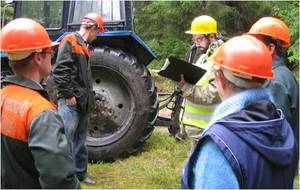FSC certification an asset for forest carbon projects
A study commissioned by the Rainforest Alliance reveals that numerous synergies exist between the FSC Principles and Criteria for forest management and voluntary forest carbon standards. Importantly, it identified opportunities that could help to unlock certification opportunities not only in the tropics, but in other regions too.
This study was carried out in recognition of the role that sustainable forest management has in retaining and increasing forest carbon stocks. The 2007 IPCC report identifies tackling forest loss and degradation – which accounts for an estimated 15 per cent of global greenhouse emissions – as a powerful tool for mitigating climate change.
Mutually beneficial
The sustainable forest management movement – and specifically the FSC system – has gained kudos for credible standard-setting, governance and accreditation. The emerging voluntary carbon market could provide a mechanism and necessary funding that could boost FSC certification – which currently sits at just 7 per cent of the world’s productive forests – while reducing greenhouse emissions. Being relatively new, the forest carbon certification could benefit from the fifteen years’ experience that FSC has built.
"The study reveals that many synergies exist between FSC and carbon standards, presenting opportunities for each standard to be strengthened while staying true to their objectives." - Jeff Hayward, Rainforest Alliance Climate Programme Director
“The study reveals that many synergies exist between FSC and carbon standards, presenting opportunities for each standard to be strengthened while staying true to their objectives”, states Jeff Hayward, Rainforest Alliance Climate Programme Director.
Produced by NEPCon, the study includes a review of the FSC Principles and Criteria against three voluntary carbon market standards: the Verified Carbon Standard (VCS); the Climate, Community and Biodiversity Standards (CCBS); and the CarbonFix Standard.
Crucially, it introduces case studies in seven countries, highlighting areas where FSC and carbon standards overlap and diverge and how they can be reconciled: Brazil, Guatemala, Panama, Peru, Switzerland, Tanzania and Uganda.
More synergies than gaps
The report, which was funded by IKEA, reveals that the FSC standards are the strongest at ensuring forest management operations meet extensive social and environmental criteria”, says Mateo Cariño Fraisse, Climate Coordinator at NEPCon, who authored the report. This can be largely attributed to the inclusion of specific indicators and the provision of guidance provided from a mature system.
 This is due to the specific indicators that deal with forest management, but also to the large amount of additional guidance that the system, more experienced that the still in earlier development stages carbon systems, has established along the years.
This is due to the specific indicators that deal with forest management, but also to the large amount of additional guidance that the system, more experienced that the still in earlier development stages carbon systems, has established along the years.
Across all field studies, FSC certification positively impacted all aspects of forest carbon projects: legal frameworks; financial stability; environmental and social impacts; sustainable forest management; and even carbon accounting which is not explicitly covered in the FSC standard.
This can be largely attributed to the comprehensive information generated to fulfil FSC certification which can be subsequently used in the carbon verification process.
Obstacles were mainly related to the cost of dual certification, particularly for small‐scale projects. While indicators across different standards can be similar in intent and impact, slightly different wording can result in the different interpretations. Streamlining templates for standards could make dual certification less time intensive and costly.
Download the report
Field perspective: comparison of forest carbon and forest management standards (PDF)



